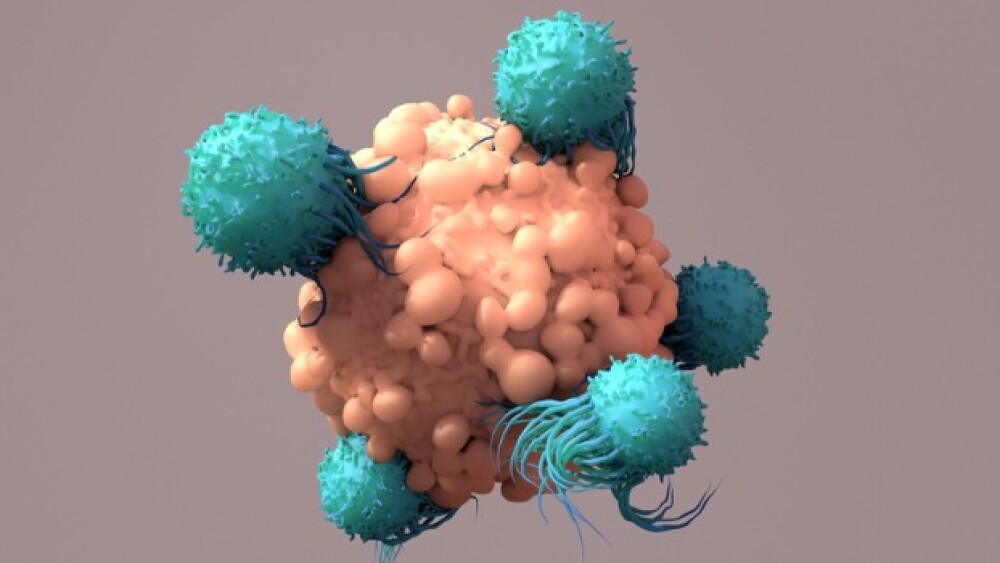The company announced Monday with its second-quarter earnings that the regulator has officially halted the Phase I study after a child with acute myeloid leukemia died following treatment.
Pictured: T-Cells work to fight cancer / iStock, Design Cells
The FDA has issued a clinical hold for 2seventy bio’s Phase I trial of its experimental CAR T cell therapy for acute myeloid leukemia, the company announced Monday with its second-quarter earnings. The regulatory move comes after the company’s partner Seattle Children’s in June paused the trial following the death of a patient in the trial—the first child to receive the second dose level of the treatment.
In the past couple months, 2seventy and Seattle Children’s, the hospital conducting the trial, have been investigating the incident, the company said in its press release.
“This investigation provided insights into the potential pathobiology of this toxicity which led to several study protocol changes, which the team believes may mitigate this toxicity and allow for the continuation of the PLAT-08 study. 2seventy bio and Seattle Children’s will continue to work with FDA to provide the root cause analysis and proposed changes for the clinical study. Based on upcoming discussions with FDA, 2seventy bio and Seattle Children’s plan to amend the study accordingly and resume this study as soon as possible.”
Original story posted June 14:
2seventy bio’s CAR-T Trial Halted After Pediatric Death
On Wednesday, 2seventy bio announced its partner, Seattle Children’s, paused a Phase I CAR T-cell therapy trial for pediatric acute myeloid leukemia after a patient death.
The child was the first to receive the second dose level of 2seventy’s investigational drug-regulated CAR T-cell treatment. The therapy utilizes the company’s DARIC technology to enable “on-demand” control of the engineered T-cell responses. The Phase I trial is the first-in-human study of the DARIC T cell platform.
The root cause of the Grade 5 (fatal) event is under investigation, and 2seventy is in communication with FDA. At the same time, the company assesses the data surrounding the serious adverse event and the “potential next steps for the study,” CMO Steve Bernstein said in a statement. The trial was slated to enroll 18 patients with a primary completion date of February 2024.
While CAR T-cell therapies have had clinical success in blood cancers, the therapies also come with a fair share of risks. CRISPR Therapeutics lost a patient after being treated with its one-time CAR T therapy CTX110 in 2020. Since then, the company has released positive trial data for patients with relapsed or refractory CD19+ B-cell malignancies and initiated a Phase II study.
After two patients in a solid tumor trial died, Tmunity Therapeutics halted the development of its PSMA-specific, TGFβ-resistant cell therapy to treat prostate cancer in 2021. The patients died from a known side effect of CAR-T therapy—immune effector cell-associated neurotoxicity syndrome (ICANS). Kite Pharma has since scooped up Tmunity, leaving out the failed therapy from the acquired pipeline.
Last fall, Celyad Oncology stopped the development of its CAR T-cell therapy after two patient deaths. The FDA had lifted its clinical hold after five months, but the company chose to drop the program after a strategic review due to the costs and delays associated with the temporary hold.
Having spun out from bluebird bio, 2seventy already has one commercialized CAR-T cell therapy. Partnered with Bristol Myers Squibb, Abecma was the first T-cell therapy for multiple myeloma. Currently approved for patients who have failed at least four prior lines of treatment, recent data for the BCMA CAR-T cell therapy have the companies gunning for FDA approval for earlier treatment in this patient population.
Kate Goodwin is a freelance life science writer based in Des Moines, Iowa. She can be reached at kate.goodwin@biospace.com and on LinkedIn.






